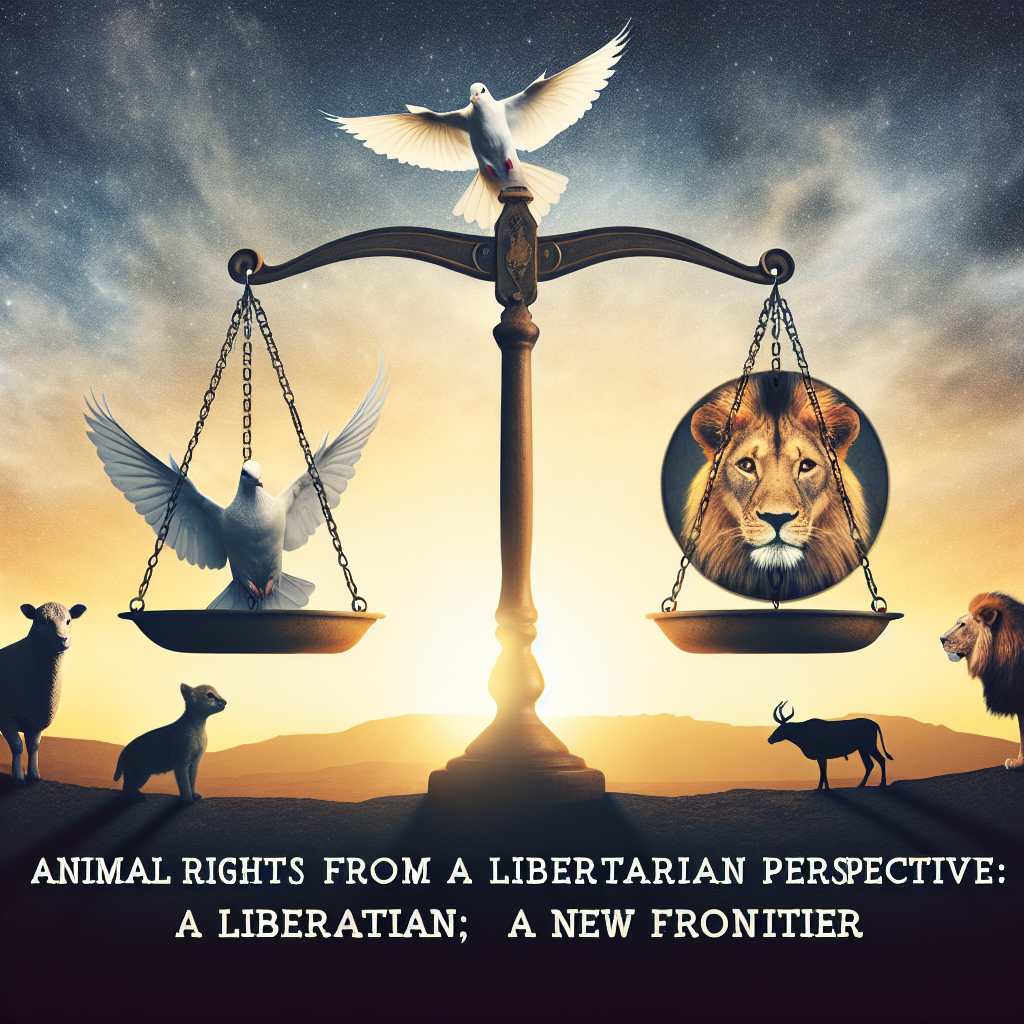Animal Rights from a Libertarian Perspective: A New Frontier
The topic of animal rights has long been a contentious issue, with various philosophical perspectives offering differing views on the moral status of non-human animals. Among these perspectives, the libertarian viewpoint presents a unique and often underrepresented stance that aligns individual liberty and property rights with the ethical treatment of animals. This article explores animal rights from a libertarian perspective, examining the principles that underpin this ideology and its implications for the future of animal welfare.
Understanding Libertarian Principles
Libertarianism is grounded in the belief that individuals have the right to make choices about their own lives, free from coercion and intervention by the state. This philosophy emphasizes:
-
Individual Rights: Central to libertarian thought is the concept of individual rights, which includes the right to own property and engage in voluntary exchanges.
-
Non-Aggression Principle (NAP): Libertarians advocate that aggression against others is inherently wrong. This principle serves as a foundation for moral interactions and governs relationships between individuals and entities.
- Free Market Solutions: Libertarians believe in the power of the free market to create solutions to social issues, including animal welfare.
The Case for Animal Rights within Libertarianism
While traditional libertarianism may not explicitly endorse animal rights, a compelling case can be made that aligns the ethical treatment of animals with libertarian principles. Here’s how:
Respect for Individual Rights
Animal rights advocates argue that sentient beings, including animals, possess inherent rights that must be respected. A libertarian perspective aligns with this notion by extending the recognition of individual rights beyond humans. This can manifest in various ways:
-
Legal Personhood for Animals: Some libertarians support the idea that certain animals should be granted legal personhood, allowing them protections similar to those afforded to humans under the law.
- Protection against Cruelty: Libertarians can advocate for laws that protect animals from cruelty, aligning with the NAP. Thus, individuals who harm animals would be violating the rights of those beings, making such actions warrant legal intervention.
Non-Aggression Principle and Animal Welfare
The non-aggression principle serves as a linchpin for libertarian ethics. It posits that initiating force against another individual, whether human or animal, is unjustifiable. The implications for animal welfare are profound:
-
Opposition to Factory Farming: Factory farms often rely on aggressive practices that deprive animals of their natural behaviors. Libertarians who uphold the NAP can argue against such practices on moral grounds, advocating for a shift towards more humane farming methods.
- Promoting Ethical Consumption: Libertarians can support the rights of consumers to make informed choices about animal products, thereby encouraging ethical farming practices through market demand without resorting to coercive regulations.
The Role of the Free Market in Advancing Animal Rights
Libertarians often emphasize voluntary exchange and the free market as mechanisms for addressing social issues. When applied to animal rights, this perspective can lead to innovative solutions:
Market-Driven Alternatives
-
Plant-Based and Lab-Grown Meat: The rise of lab-grown meat and plant-based alternatives offers consumers humane choices that do not rely on animal suffering. Libertarians can endorse such innovations as a market response to the ethical concerns surrounding animal rights.
- Animal Sanctuaries and Nonprofits: Many private organizations and sanctuaries operate to rescue and rehabilitate mistreated animals. A free-market approach supports these initiatives by encouraging donations and voluntary contributions instead of government funding.
Empowering Consumers and Animal Activism
Libertarian principles empower individuals to take action on issues they care about, including animal rights. This empowerment manifests in:
-
Educational Campaigns: Libertarians can promote education on responsible pet ownership, humane treatment of animals, and the ethical implications of consumption choices.
- Voluntary Animal Advocacy: Individuals can organize grassroots campaigns and activism efforts to promote animal welfare without relying on government intervention.
Overcoming Challenges: Bridging Libertarian Ideals and Animal Rights
Despite the compatibility of libertarianism and animal rights, there are challenges inherent in reconciling these ideologies:
-
Cultural Attitudes: Changing deeply ingrained cultural attitudes towards animals will require persistent efforts and education, as not all libertarians prioritize animal rights equally.
- Balancing Property Rights: Libertarians often emphasize property rights, which can conflict with animal welfare initiatives. Finding common ground between protecting property rights and ensuring humane treatment is essential.
Conclusion: A New Frontier for Animal Rights
As discussions surrounding animal rights evolve, the libertarian perspective offers a refreshing and ethically robust approach to the issue. By emphasizing individual rights, the non-aggression principle, and market-based solutions, libertarians can champion a future where the treatment of animals aligns with core libertarian values. As we enter this new frontier, the dialogue around animal rights can foster greater cooperation among advocates, entrepreneurs, and consumers dedicated to creating a more ethical world for all sentient beings.
In this journey, a constructive approach that respects both individual freedoms and the rights of animals may lead to a more harmonious and just society.
Share this content:












Post Comment